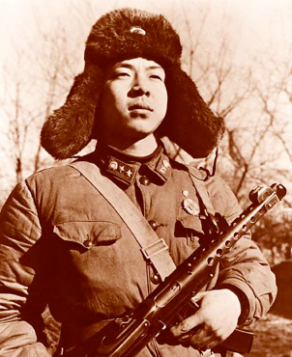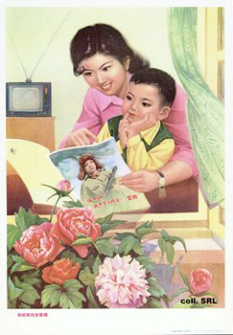Today is no ordinary Tuesday in early March. Today is “Learn from Lei Feng Day” (学雷锋日). And you know what that means: Chinese newspaper editorials, take it away!
“Whatever one does should never be at the expense of another, extending a helping hand to the needy and helping others are expected in a civilized society. To be a good citizen is the prerequisite for learning from Lei Feng.”
This, from Xinhua, reminds us how much of a good Samaritan the possibly concocted enigma really was. In concluding, the editorial states, “with an increasing number of people becoming too concerned with money and materialistic gains to spare a thought for others, the promotion of the Lei Feng spirit may function as a reminder that the pursuit of materialistic gains alone is not enough in life.” Hear, hear! Who can argue with that?
Until we remember that Mr. Lei is an altruistic, loyal, and kindhearted Chinese Communist Party hero (concocted or not). Surely one day out of the year to remember the original system of governing is enough to make up for 364 days of unbridled “capitalism with Chinese characteristics?” Pff, semantics! Let’s see what else the editorial boards had to say:
“Lei has gradually become a universal role model as political overtones surrounding him fade. Those who object to glorifying Lei’s spirit are intent on trampling morality for the sake of political point scoring…. A poll conducted by the Global Times last year showed that most Chinese have a positive perception of Lei, with nearly 90 percent of respondents voicing disdain toward those skeptical of the good Samaritan soldier.”
Daaayumn! Though I never met a single person in Hunan that fully believed the LF back-story, there sure are a lot of people who are apparently ready to defend his posthumous reputation. Perhaps it’s neither the story nor the soldier that people like to cling to for hope; it’s the notion that doing good in this world for something other than monetary or political gain is still worthy of praise. In certain places around the world, maybe this has become something of a foreign concept (eyes on you, U.S.).
And speaking of America, what did our papers have to say on this momentous occasion?
“In photos of suspiciously good quality and quantity, Lei Feng smiles as he polishes his army truck or darns his comrades’ socks at their platoon. He never went to bed without first reading Chairman Mao’s works, the Chinese are told. The same truck killed him in 1962 at age 21 when a laundry pole flattened by another driver sprang back and struck Lei in the head.”
USA Today offered this vignette, along with a skeptical yet hopeful story about Xi Jinping’s well-timed sign-off to his nation’s people. He – along with former Premier Wen Jiabao, whose remarks today noted that China’s leadership “should unwaveringly combat corruption … and ensure that officials are honest, government is clean and political affairs are handled with integrity” – are clearly exemplary of the Lei Feng spirit. *cough*
But talk is cheap. And so are good deeds:
“A majority of people questioned Tuesday said they did not realize it was ‘Learn from Lei Feng Day,’ and had not done any good deeds on purpose. … But although 70 percent admitted they did not know Tuesday was Lei Feng Day, most respondents said that dedicating March 5 to Lei Feng is meaningful as it promotes a healthy social atmosphere.”
It’s almost like “Pay it Forward” day, but with more meaningful propagandizing. Apparently the Global Times wasn’t looking to hop on the bandwagon with their editorial, quoting a handful of older residents who basically called B.S. on the whole thing (and one 13-year-old student who claimed, “he must be real, otherwise where do those Lei Feng’s diary we learnt from our text books come from?”) Oh, you poor, poor thing. (And copy editors, for shame!)
While it’s easy to criticize another nation’s folk hero, especially on his Big Day, it’s worth remembering that all our selfless, altruistic, died-too-young protagonists are probably too good to be true as well. And maybe it’s worth taking one day out of the year to help that old lady cross the street, toss some change in the beggar’s cup, or to perform some unrequited act of kindness in the name of do-gooding.
Maybe we can learn from “Lei Feng,” after all.
(Get ’em while they’re young. Image courtesy of http://www.iisg.nl/today/images/e13-416.jpg)


